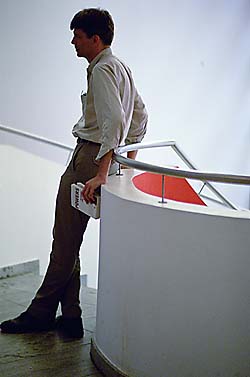NBA : Coulisses

This year, I was a judge. What that means is that between the beginning of May and the middle of August, I (and my four fellow judges) read 258 books. Each. The same 258 novels. To put that in perspective, it's pertinent to note that outside of a Bible and a phone book, many households in the United States probably own (and read) zero works of serious fiction.
Nonfiction outnumbers fiction in new titles published each year by 4 to 1, so the nonfiction judges read twice what we did — 500 submissions. One judge remarked that she came home one day to find her children had constructed a fort out of them. In my case, I constructed an elaborate system of piles: read, unread, couldn't get past Page 10, crap, bloated, vomitous, kill-me-now and praise God.
The criteria for submission was that the publisher pay $100 to the National Book Foundation for each book submitted and then send a copy of the book (or manuscript) to each judge. The author had to be a citizen of the United States. In our first conference call, we began to try to define what we were looking for. A "national" book? A work of fiction that spoke to the "American" character? Judge No. 1 wanted "readability," and No. 5 wanted "a sense of discovery." I just wanted writing that would set my hair on fire.
To be eligible, all novels had to be published in 2006, and the list included books by Roth, Updike, McCarthy, Richard Ford, Stephen King, Walter Mosley, Edward P. Jones, Mary Gordon, Dave Eggers, Charles Frazier, Bobbie Ann Mason, Tom McGuane, Joyce Carol Oates. (Only two from her. Musta been a slow season.)
Through conference calls and e-mail, the five of us started to get a sense of one another's tastes and personalities, and we discovered that we had more in common than not. Peter Behrens' "The Law of Dreams" was an early favorite, as was "The Echo Maker" by Richard Powers (my hair-on-fire favorite and the eventual winner) and "White Guys" by Anthony Giardina. All of us were in favor of Roth's "Everyman," though we agreed it was not his strongest book (except for No. 4, who called it equal to Tolstoy). Judge No. 2 kept pressing for "The Zero" by Jess Walter. Cormac McCarthy's "The Road" made me cry but left everyone else unmoved. Judge No. 4, an admitted friend of Roth's, had another favorite — "Only Revolutions" by Mark Danielewski, which none of the rest of us could fathom but he would not give up on. We began to know that in every conference call No. 4 would speak at length and very movingly in support of the book, and I finally said, "If Danielewski had written the novel you're describing, he'd deserve a Nobel, but I can't find a wormhole into that experience on the page."
Nevertheless, he was persistent — a strategy that, in the end, paid off.
Thomas Pynchon's 1,000-page doorstop came in after deadline owing to last-minute rewrites, but by the first week in September, we had five books we all more or less liked.
And we were uniformly underwhelmed.
There were no women on the list, and the titles themselves read like an anti-feminist haiku — "White Guys," "The Echo Maker," "Everyman," "The Law of Dreams," "The Zero." After months of thinking that we had to find individual books we endorsed, we suddenly realized that we needed to start thinking about a list we endorsed.
Roth, who has won the award twice, was never the front runner (except with Judge No. 4), and it seemed insulting to keep him on the list knowing he would lose. So we dropped him and allowed No. 4 to place Danielewski on the list instead. "White Guys" and "The Law of Dreams" we replaced with "Eat the Document" by Dana Spiotta and "A Disorder Peculiar to the Country" by Ken Kalfus.
When this newspaper ran a front-page article with the final list, a friend e-mailed me: "Who are these people? I don't know any of them!"
Well, exactly.
Wonderful, under-read writers. No longer so foreign. On the map, finally. Like Poland or Turkey or someplace like that.
Marianne Wiggins

0 Comments:
Enregistrer un commentaire
<< Home